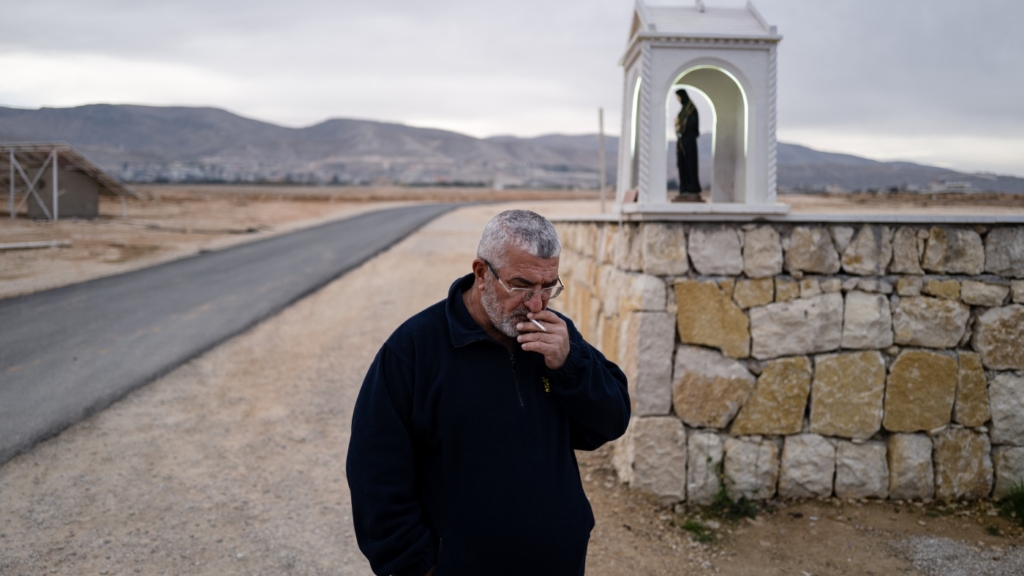This content discusses the situation in YOUNINE, Lebanon, near the border with Syria, where Rafaat Nasrallah, a Lebanese Christian, shares his perspective on the ongoing conflicts in both Lebanon and Syria. The article highlights the impact of the Syrian refugee crisis on Lebanon and the recent return of some Syrians to their homeland, bringing a sense of hope after years of violence. The content includes images captured by Ayman Oghanna for NPR, depicting the realities and challenges faced by the people living in the region. Bu içerik, Suriye’deki devrimin son aşamalarını ve Hayat Tahrir al-Sham (HTS) adlı bir cihatçı grupun hızlı ilerleyişini ele almaktadır. HTS, son günlerde İdlib, Halep, Humus ve Şam’ı ele geçirerek Suriye’de ilerlemiştir. Bu durum, devrik rejime sadık binlerce Suriyelinin yerinden edilmesi ve İran’dan Suriye’ye ve Lübnan’a uzanan bir tedarik hattının kesilmesini tehdit etmektedir. Ayrıca, İsrail’in hedef aldığı tedarik hatları arasında da yer almaktadır. Ayrıca, içerikte Suriye ve Lübnan arasındaki sınırın önemine ve bölgedeki yaşanan çatışmaların etkilerine de değinilmektedir. 4, Fatima Salah shows a picture on her phone of her cousins who were killed in an Israeli airstrike in Lebanon near the border with Syria. She is seen picking through the rubble of her family home that was destroyed in the attack. Despite her loss, she witnesses Syrians returning to their homes across the border and others seeking refuge in Lebanon. The images captured by photographer Ayman Oghanna for NPR depict the aftermath of the tragic event and the resilience of the people affected. Bu içerikte, Fatima Salah’ın öldürülen kuzenlerinin telefonundaki resmini gösterdiği anlatılıyor. Resim, bir Ayman Oghanna tarafından çekilmiştir. Salah, Suriye ve İsrail’in daha geniş bir savaşın iki cephesi olduğunu düşünmektedir. İsrail ve Hizbullah’ın Lübnan’dan çekilmesine ilişkin bir ateşkes anlaşması yapılırken, Suriye’deki isyancıların Esad güçlerine karşı ilerlemeye başladığı belirtiliyor. Salah, bu gelişmelerin ABD ve İsrail’in Esad, İran ve Hizbullah’ı zayıflatmayı amaçladığını düşündüğünü ifade ediyor. HTS gibi Sünni gruplara karşı dikkatli olmaları gerektiğini belirtiyor. Ayrıca, evinin İsrail hava saldırısı sonucu ne hale geldiğini gösteren bir resim de bulunmaktadır. Bu içerikte, babası ve dedesi gibi Lübnan-Suriye sınırında koyunları otlatan bir adamın hikayesi anlatılmaktadır. Bu bölge geniş çaplı bir bölgesel savaşın bir hat hattı haline gelmiştir. Ali Zgheib, annesinin Suriyeli olduğunu ve Homs şehrinde yaşadığını belirtmektedir. Kendi çiftliğinde çalışırken, İsrail’in Lübnan’da devam eden hava saldırıları ve Suriye’de kontrolü ele geçiren Sünni isyancılar arasındaki korkularını dile getirmektedir. Eğer bu iki savaş bir araya gelirse, endişeli bir ses tonuyla, “Burada olacak. Ve artık ateşkes olmayacak.” şeklinde ifade etmektedir. Bu içerik, içerik açıklaması oluşturarak yapay zekanın nasıl kullanılabileceği ve iş dünyasına nasıl fayda sağlayabileceği hakkında bilgi vermektedir. Yapay zeka teknolojisinin iş süreçlerini optimize etme, verimliliği arttırma ve karar alma süreçlerini iyileştirme potansiyeline sahip olduğu vurgulanmaktadır. Ayrıca yapay zeka ile ilgili temel kavramlar, uygulama alanları ve avantajları da ele alınmaktadır. Bu içerik, yapay zeka teknolojisinin iş dünyasındaki önemini anlamak ve uygulamak isteyen okuyucular için faydalı bilgiler içermektedir. Bu içerik, içerik oluşturucuların içerik açıklamaları hakkında bilgi edinmelerine yardımcı olmak amacıyla hazırlanmıştır. İçerik açıklaması, bir içeriğin ne hakkında olduğunu, hangi konuları ele aldığını ve hangi bilgileri sunmayı amaçladığını özetleyen metindir. İçerik açıklaması, okuyucuların içeriği daha iyi anlamalarına ve içeriği değerlendirmelerine yardımcı olur. Bu içerik, içerik oluşturucuların içerik açıklamalarını nasıl oluşturacaklarını ve neden önemli olduklarını öğrenmelerine yardımcı olacak ipuçları ve öneriler içermektedir.
[ad 1]
Kaynak: www.npr.org















Yorumlar kapalı.